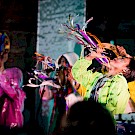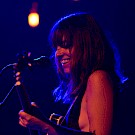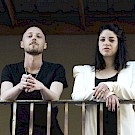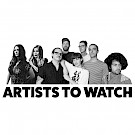 After releasing her fourth studio album, Invisible Empire // Crescent Moon, Scottish icon KT Tunstall felt creatively drained. Shifting her focus back to her personal life, Tunstall took a few years off from recording to regain the inspiration and drive she had lost. Now, Tunstall has made her return with her fifth album, KIN, released earlier this month. In the middle of her US tour, Tunstall took some time out before her Chicago show to talk to Vortex about her new album, her time off, and what to expect when she hits Portland’s Wonder Ballroom on Wednesday, September 28.
After releasing her fourth studio album, Invisible Empire // Crescent Moon, Scottish icon KT Tunstall felt creatively drained. Shifting her focus back to her personal life, Tunstall took a few years off from recording to regain the inspiration and drive she had lost. Now, Tunstall has made her return with her fifth album, KIN, released earlier this month. In the middle of her US tour, Tunstall took some time out before her Chicago show to talk to Vortex about her new album, her time off, and what to expect when she hits Portland’s Wonder Ballroom on Wednesday, September 28.
KIN has been out for a few weeks now. How’s the response to the record been?
It’s been pretty exceptional I’d have to say. Particularly with the live shows. Even since before the record was out, it’s just been an amazing response to the new material. Because sometimes it takes a bit of time for fans to get with new songs. They may be enjoying it, but it’s hard for them to get really involved with it. But this stuff’s just been so immediate with the crowd. I’ll teach them the chorus and they’re singing along already. I’ve just found that it’s a very quick pickup by the crowd, and certainly online too. It’s been really funny because they’ll be sending me these really personal messages saying, “I can totally feel your positive energy.” [Laughs] We’ve never had this energy conversation before, fans and I.
This is a different sound for you compared to some of your previous work. Two years ago, you were four albums in and you said you felt like you died creatively. What was it like creating such a different sound? What brought life back into this project and inspired you to create something so different?
I think that kind of artistic death that I went through is probably quite a familiar journey for a lot of artists, where at some point in your career things bleed through the boundary that you’ve set up between you and your personal life. My personal life became a lot more important, and I think my music had been absolutely the priority in my life for 20 years. So it was a really life-changing and significant and ultimately great moment where I said, “Hang on a minute. I need to stop and reevaluate what I actually want, because I’ve forgotten.”
The dream that I had to be a touring musician and to be successful to the point where I didn’t need another job was always my goal, which I achieved tenfold on that first record very unexpectedly. I achieved that in 2005 [laughs] and now it’s 2016. So it’s also a weird feeling of actually fulfilling a dream and although it’s an amazing thing, you need to come up with new dreams.
I find the journey of fulfillment is what is enjoyable. It’s the journey through the life of that intention. And it’s not to say there’s not gratitude in reaching it, because I toured for 10 years and had an amazing time, but I definitely reached a place where I realized that my personal life had been wiped. I had become a very mature, experienced and capable musician and I neglected myself as a person outside of being a musician. So it became apparent that I really needed to just throw everything on the fire and start again. My father had passed, my husband and I had just broken up; I ended up selling everything I owned and moving to Venice Beach. Which was the best thing that I’ve ever done. And then I could just very slowly and gently heal and rebuild in a really beautiful part of California.
I was really into writing film scores and got into the Sundance Institute’s Film Composers Lab. I was just learning something new and flexing different creative muscles, and that was really wonderful and really reenergizing. Then it was about a year after that where I really thought I was going to take like five or 10 years off of making records. I thought I was done for a while. I didn’t think I was done forever, but I had no intention of making another record. It just didn’t appeal to me.
My favorite place to listen to music is in the car. I was driving by Laurel Canyon and Topanga Canyon and over the Hollywood Hills and the Pacific Coast Highway listening to Tom Petty and Fleetwood Mac and Joni Mitchell and Neil Young and these seminal artists who wrote their music there and I’m driving the roads that they drove when they were probably listening to their demos. It just seeped into my blood, and I found myself waking up in the middle of the night, as I usually do when I’m beginning to write a record, with these really big quite muscular, emotional pop choruses. I just felt like I hadn’t really written that kind of thing since the first record. There was something linking it back to the freedom that I felt when I was making that first album.
KIN seems like one of the bigger followups to Eye to the Telescope, with that album being such a major success, “Black Horse and the Cherry Tree” getting a Grammy nomination. Were you nervous trying to follow up such a success?
 I think since having that success with that first record, I have not been nervous at all. All I’ve been is completely excited to get this to fans. And of course there’s been apprehension and nervousness on the previous ones. I think Invisible Empire // Crescent Moon was an anomaly. It was a very emotional folk record. It was very different than my previous records, in a category of its own really. It was kind of a sanctuary during a really difficult time. I happened to make a record during some really big shifts in my life. But it was not a usual record for me. And KIN for sure, I know it feels right because I’m not nervous about it.
I think since having that success with that first record, I have not been nervous at all. All I’ve been is completely excited to get this to fans. And of course there’s been apprehension and nervousness on the previous ones. I think Invisible Empire // Crescent Moon was an anomaly. It was a very emotional folk record. It was very different than my previous records, in a category of its own really. It was kind of a sanctuary during a really difficult time. I happened to make a record during some really big shifts in my life. But it was not a usual record for me. And KIN for sure, I know it feels right because I’m not nervous about it.
Let’s talk about the live show. You’re on tour right now, you’re coming to Portland next week.
Yeah, I can’t wait!
You’re known for using loop pedals during performances. Is there some of that on this tour? How have you translated this album?
I went through a very limited period of time where I kicked back against the loop stuff because I felt it was a little too gimmicky. I was concerned about being recognizable by this $150 loop pedal rather than the actual music. But I got over that really quickly and realized that actually it was just such an amazing asset to have a signature that was recognizably me. It’s a really valuable thing to have in an overpopulated scene of music. It’s wonderful to have this thing that is recognizably you. So I really reembraced the loop pedal as an intrinsic part of my art. I’ve tried changing it up because I’ve seen amazing people using various different things, but I always come back to the same thing because it really is the most organic and authentic thing that they can understand what I’m doing. They can get it straight away. There’s no trickery. There’s nothing saved. They see me perform it and then they see me repeat it back to them. There’s just something very simple and very powerful about that.
And so yeah, I absolutely still have the loop pedals as part of the live setup. There’s four of us on stage, which is the smallest band I’ve had. Drums, bass and keys. But it’s definitely the most powerful sound that I’ve had, ironically. It’s a huge-sounding band. We’ve been a little more experimental with the sound. There’s some definite psychedelic influence on the new album from bands like Django Django and Tame Impala. I was listening to Devendra Banhart a lot. So it’s introducing some of those elements with effects and samples.
It sounds like the fan output has been really positive for this tour.
Yes, and the thing that I’m continuing to love about touring is that people in my audience seem to range from 7-year-olds to 77-year-olds. It’s this incredibly diverse group. Which is just such a compliment. I’ll have a 14-year-old guitarhead emo guy bring his grandma because they both like the stuff for different reasons. He likes all the gear and she likes the words. I think that people have a very visceral response to someone who really plays.
What should Portland know about this show and what should they expect coming out?
I think more than ever, I feel that I’m engaging with putting on a live show that is super memorable for people. And part of the reason the record is called KIN is about that experience. It’s about getting into a room together for an hour and half or two hours and it doesn’t matter who you are, where you come from, what you do, what color you are, or who you decide to kiss. It doesn’t make any difference. It’s this amazing thing at shows where strangers come together with one thing in common, and that’s the music. They wanna hear the music, they wanna enjoy themselves and they wanna feel. I really more than ever feel a responsibility and a lot of gratitude to have that opportunity to provide that experience for all of us, me included. I’m just very thankful about being in that driver’s seat for putting on a show. We’ve really put a lot of thought into how it looks, how it feels, how it sounds, and more than ever, I just love engaging with the audience and getting to know people.





